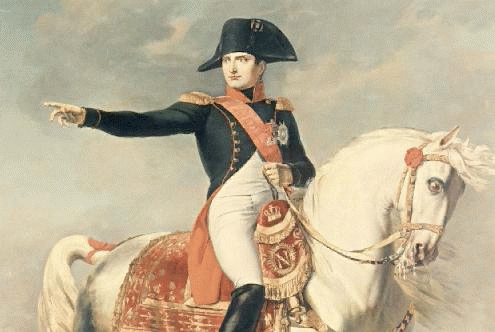 |
| http://knarf.english.upenn.edu/Gifs/napoleon.gif |
Napoleon was viewed in many different ways; some saw him as a hero and other saw him as a tyrant. Nevertheless Napoleon Bonaparte was a conqueror of many lands. Under his rule he influenced the lives of many; some for the better and some for the worse. Napoleon impacted the social, economic, and political systems of many European countries. He abolished serfdom in the countries he took over. He created new trade agreements with different countries, improving the economy for every country under his command. Lastly, even though he was a dictator he gave the people more power and say in their local government. He made the day to day lives of his people better in a way they never imagined. The new lives Napoleon created for his people will have an everlasting effect on their countries.
Not everyone was a fan of Napoleon, such as Madame de Stael, the daughter of one of King Louis XVI's advisers. She viewed Napoleon as a tyrant who is war crazed and has no appreciation for elegance and intellectual riches. de Stael grew up as nobility which was not treated as well under Napoleon's rule as they were under King Louis's. For that reason is against Napoleon and everything he stands for. On the other hand the soldiers that serve him, as in the case of Marshal Michel Ney were great supporters of Napoleon. Ney viewed Napoleon as a brave and courageous leader who is the rightful emperor of France. He calls Napoleon the "immortal legion" and "august emperor". This shows that the people who knew him respected him and the nobility hated him. Napoleon did many things to help the lower class, which in turn gave him the largest army of his time. All his soldiers were volunteer, he never had a draft for his wars. His people rallied behind him in support for his conquests.
 |
http://upload.wikimedia.org/wikipedia/commons/f/f5/
Europe_1812_map_en.png |
Under Napoleon's great reign the people of Italy, Austria, Belgium, Venice, Egypt, Holland, Prussia, Russia, Spain, and for a little while Portugal were able to experience power and prosperity they never felt before. Once Napoleon gave these people better lives they didn't want to go back to the way things were before. As a result when Napoleon fell and the old government and nobles came back to reclaim what they had lost, the people naturally resisted. They didn't want their old government and system back, which led to the many revolution that occurred in Europe. Because they wanted what Napoleon gave them they resisted going backwards. Napoleon impacted every aspect of their lives he made them richer, he gave them more of a voice, and most of all he minimized class distinction. With serfdom abolished and nobles with less power, Napoleon created a society where the majority of people prospered and benefited. This effect lead them to having revolution in the near future after the fall of Napoleon.
 Napoleon forced the new Haitian people to pay him 100 million francs for official recognition. But to make matters worse for this young nation is that they had to borrow the money from a single French bank. This enabled the bank to charge extravagant interest rates; making Haiti unable to pay off it's debt for almost a century. This debt put a severe damper on Haiti's economy, and to add on to their failing economy they were suffering from post-independence isolation from rest of the world. Different countries may have isolated themselves from Haiti for various reasons, but there was one major common reason. The Haitian leader Toussaint
L'Ouverture was a well respected man black man among the Haitian people. He helped in the success of the slave revolt that took place in Haiti, which made many other nations scared. L'Ouverture abolished slavery within Haiti which made their economy suffer even more on top of everything else.
Napoleon forced the new Haitian people to pay him 100 million francs for official recognition. But to make matters worse for this young nation is that they had to borrow the money from a single French bank. This enabled the bank to charge extravagant interest rates; making Haiti unable to pay off it's debt for almost a century. This debt put a severe damper on Haiti's economy, and to add on to their failing economy they were suffering from post-independence isolation from rest of the world. Different countries may have isolated themselves from Haiti for various reasons, but there was one major common reason. The Haitian leader Toussaint
L'Ouverture was a well respected man black man among the Haitian people. He helped in the success of the slave revolt that took place in Haiti, which made many other nations scared. L'Ouverture abolished slavery within Haiti which made their economy suffer even more on top of everything else.  Outside of the French and Haitian relationship laid America, the first nation to be born in the new world. Although America had gone through similar circumstances with the British during their revolution, they did not support Haiti. In fact, America did not recognize Haiti as an independent nation until six decades later when it was in midst of the American Civil War. During the time when Haiti became independent Thomas Jefferson was Vice President of the United States and later became President. He tried to block off trade with Haiti, joined forces with France to conquer Haiti, and kept the American people as far as possible from Haiti. Thomas Jefferson, one of the Founding Fathers of American, and a major player in the American Revolution was trying to stop a revolution. He was scared that the ideas and ideals in Haiti will spread to the American South. Thomas Jefferson didn't want black slaves in America to revolt as they did in Haiti. He didn't want them to be inspired by Toussaint L'Ouverture as a black leader of his own nation.
Outside of the French and Haitian relationship laid America, the first nation to be born in the new world. Although America had gone through similar circumstances with the British during their revolution, they did not support Haiti. In fact, America did not recognize Haiti as an independent nation until six decades later when it was in midst of the American Civil War. During the time when Haiti became independent Thomas Jefferson was Vice President of the United States and later became President. He tried to block off trade with Haiti, joined forces with France to conquer Haiti, and kept the American people as far as possible from Haiti. Thomas Jefferson, one of the Founding Fathers of American, and a major player in the American Revolution was trying to stop a revolution. He was scared that the ideas and ideals in Haiti will spread to the American South. Thomas Jefferson didn't want black slaves in America to revolt as they did in Haiti. He didn't want them to be inspired by Toussaint L'Ouverture as a black leader of his own nation. Haiti suffered from all aspects and all corners of the globe when they became independent. They themselves hurt their economy in a extravagant manner by abolishing slavery. They suffered even more as they owed France 100 million france; and could only take a loan from one French bank. The Haitians were isolated from the world without any allies to help them in their state of despair. America tried everything possible to hold Haiti down because they were scared of what it would do in their own nation. From the very start of Haiti's independence they suffered a great deal which had an impact that lasted years after. As they were a suffering nation to begin with, in 2010 they felt the impact of a devastating earthquake that destroyed a large portion of their country. A tragedy that would cost them 14 billion dollars to rebuild, after rebuilding for the last 200 years Haiti will once again have to suffer.
Haiti suffered from all aspects and all corners of the globe when they became independent. They themselves hurt their economy in a extravagant manner by abolishing slavery. They suffered even more as they owed France 100 million france; and could only take a loan from one French bank. The Haitians were isolated from the world without any allies to help them in their state of despair. America tried everything possible to hold Haiti down because they were scared of what it would do in their own nation. From the very start of Haiti's independence they suffered a great deal which had an impact that lasted years after. As they were a suffering nation to begin with, in 2010 they felt the impact of a devastating earthquake that destroyed a large portion of their country. A tragedy that would cost them 14 billion dollars to rebuild, after rebuilding for the last 200 years Haiti will once again have to suffer. 





